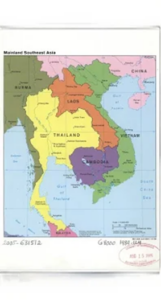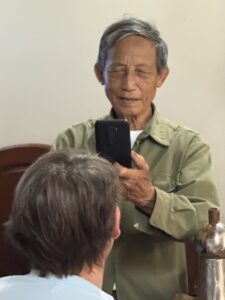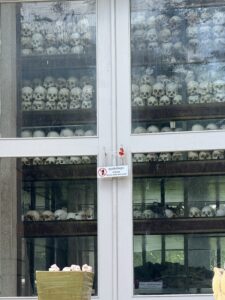
Marty Levine
May 27, 2025
I just returned from four weeks in Southeast Asia, visiting Thailand, Laos, Cambodia, and Vietnam. This was a trip I had wanted to take for many years, but I put it off because I was scared. I worried about facing the people whose lands my country had invaded, lands we had ravaged until we withdrew in 1973. During those years, I knew that war was wrong. I avoided serving in our military so that I would not be forced to personally take part in the killing, maiming, and destruction. I protested, demanding our government stop the madness. Yet I still felt responsible for the harm that was done and feared facing those we wounded. But I found the people I met, old and young alike, to not be harboring anger, and to not be seeking to punish us.
My fear of being seen as the aggressor, as the war criminal for what our nation had done, proved to be very misplaced. One specific moment along the way captured how gracious the people we met were. We were driving out from Hanoi to visit a village known for its crafts. Our trip leader, a young man whose roots were in the hills of North Vietnam, had pulled our van over to look at a project going on at a school that he did not recognize. It turned out to be the installation of an astroturf field, something very unusual amidst the fields of rice, corn, and vegetables that surrounded this small town and a common sight in the north of Vietnam. As we walked away, I asked our leader if we could find a bathroom before we got back on the road. He led us down a street further into the village and asked the first man he saw if we could take advantage of his home.
The man turned out to be an NVA (the army of North Vietnam) veteran who had fought during what they call the “American War”. He was more than gracious. When he found out we were Americans, he insisted we come inside and prepared a pot of tea, introduced us to his wife and asked her to serve us some fruit! In the conversation that followed, he told us about his service, showed us his memorabilia from his time in service and told us how excited he was to meet us, the first Americans he had met since he we were shooting at each other.

He wasn’t angry, he wasn’t looking for revenge. He had moved on with his life.
His welcome and interest in us was what I felt all along the way.
Throughout our visit, it was clear how the mix of religions (Buddhism, Hinduism, Confucianism, Animism, and Christianity) infuses the lives of the people we met. We heard much about the importance of moving on and not getting stuck looking for revenge.
What is clear is that they have not forgotten their history nor our part in it. The American War has left scars across this landscape. Scars in the unexploded bombs that still await discovery and disarming. Actual scars in the men and women who lost arms, legs, and lives as these menaces were accidentally found, with tragic consequences. Craters and tunnels across the land.
Each country has embraced its own story. One that not only reflects the pain but also the heroism of their struggle for independence, a struggle which we chose to stand on the wrong side of. Vietnam’s Women’s Museum has a major exhibit highlighting the important roles women played over the decades of their struggle. The “Hanoi Hilton” which we know because captured American airmen were imprisoned there (see the John McCain saga) is honored by remembering its full history beginning as a prison used by the French to punish those who opposed them with prison and execution before it was repurposed as a prisoner of war camp after the bombing of the north began.

And the Cambodians have not ignored their own history. As the above pictures show, the killing fields are preserved for all to see and remember when one Cambodian turned on his own people in a wave of genocidal violence. Walking through the grounds and the nearby prison, I was brought back to my visit to Treblinka and Auschwitz. Two different people, two different times, one shared common action: death and destruction designed to “cleanse” a nation of those who were thought to be threats. Are they connected by Pol Pot learning from Adolph Hitler? Or is this ability to perform horrific acts at a mass scale just a feature of humanity? As I continue to struggle to understand my Jewish brethren excusing the horror of Gaza, I, with great fear, begin to think it is the latter.
But they have not forgotten that to dwell in the recriminations of the past will keep them from fully facing the present and the future. Oh, for Donald Trump to understand that lesson!
This trip also showed me how wise Frances Fitzgerald was when she published “Fire in the Lake” in 1972. Her message was that our ignorance was our fatal flaw and that because of it we were killing Vietnamese, Laotian, and Cambodians and over 50,000 US soldiers with no hope of success. Here’s how the editors of Wikipedia summarize her message:
She argued that American values of freedom, democracy, optimism, and technological progress were inconsistent with Vietnam’s values, culture, agrarian economy, and long history of warfare with France and China, making the Vietnam War effort doomed from the start. The Vietnamese sense of government, history, politics, and war is completely different from the American one. They have had a cultural tradition of ancestor worship and a different belief in what constitutes effective government (the Mandate of Heaven). The US government’s failure to acknowledge these differences led to its failure in waging war there against the North Vietnamese and insurgents.
I remember my “aha” moment when I read her work shortly after it was published. And I had another “aha” moment as we traveled this last month.
Across the farm fields of Southeast Asia, it is impossible not to notice the family crypts that dot the landscape. In conversation with modern, college-educated young men and women, I heard both their desire to be part of the modern, western world and their recognition that their roots are in the villages of their “people” and that they have a responsibility to their ancestors to keep those roots strong. In our visits to small and isolated villages, it was clear how the land is part of their being.
Perhaps this point was most effectively underscored by reading on Sunday about the deal made between the government of Vietnam and the Trump organization to fast-track the development of a large resort property just outside of Hanoi. In its desire to defuse the Trump-inspired trade war, the Vietnamese government was ignoring these same basic realities of Vietnamese life. Here’s how the NY Times recently described the local reaction to the project that is fueled by its ignoring some basic facts about it:
- the uprooting of a cemetery with five generations of his ancestors
- and the loss of rich farmland that has sustained local families for centuries.
This was all so clear to me in my short visit. I wonder why leaders cannot understand this.
I have returned home reassured that we can live past the challenges of the moment, but only if we do not always look back. We need to keep our focus on what comes next. Learning from past mistakes is valuable but its value is only there when we seek better ways to solve the problems that have remained unsolved.
